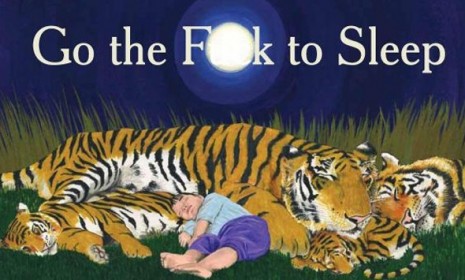What Go the F*ck to Sleep's success says about parents: 4 theories
The bedtime-story parody is packed with profanity — and it's a runaway hit with frustrated parents. Why has it struck such a chord?

A free daily email with the biggest news stories of the day – and the best features from TheWeek.com
You are now subscribed
Your newsletter sign-up was successful
Somewhat surprisingly, novelist Adam Mansbach's ultra-popular faux-children's book Go the F*ck to Sleep debuted at the top of the New York Times best-seller list. The frustrated father's expletive-laced tale of trying to get a little one to go to sleep has been greeted with glee from many parents, which has some commentators scratching their heads, and others pointing fingers. Is this profane bedtime story's popularity an indictment of today's parents? Here, four possible lessons derived from its wild success:
1. Parents need reassurance on their bedtime failures
Today's parents secretly think they're frauds, says Tom Scocca at New York. And this book lets moms and dads know they're not alone. While in most bedtime books, the parent prevails with "calm, loving unshakeable command," real-life new parents are confused and humiliated by advice from "baby whisperers" who've made bedtime an industry, says Bonnie Rochman at TIME. Mansbach's book stands out because it's an "expression of solidarity." He reassures us that no real parent enjoys the pop-culture ideal of "lights-out as a loving moment marked by cuddles and hugs."
The Week
Escape your echo chamber. Get the facts behind the news, plus analysis from multiple perspectives.

Sign up for The Week's Free Newsletters
From our morning news briefing to a weekly Good News Newsletter, get the best of The Week delivered directly to your inbox.
From our morning news briefing to a weekly Good News Newsletter, get the best of The Week delivered directly to your inbox.
2. And they're self-pitying yuppies
This "odd, rageful, beautiful little book" is funny only if the reader has "an over-the-top, pent-up fury toward one's children," says Katie Roiphe at Slate. But of course, these parents are not really mad at their kids; they're bemoaning the "Sartre-like bleakness and claustrophobia" they've made of their own lives. The book's father is so angry because, like many liberal parents, he is drowning in "a certain kind of kid-centered drabness." He wants his daughter to sleep so he can, what? Watch TV somewhere in the proximity of his wife. "Are they having sex, these slouchy rageful parents? Not enough, perhaps."
3. Parenting is just really, really hard
After struggling to get your sweet, loving child to sleep, the last thing you want is anything demanding, including sex, says Kim Voynar at Movie City News. That's why Go the F*uck to Sleep "is striking a chord with so many parents": It acknowledges how unbearably hard, draining, and guilt-wracking modern parenting is. If any parent claims she never wanted her kid "to Go. The F*ck. To Sleep," I'll tell you now, she's "lying through [her] f*cking teeth."
A free daily email with the biggest news stories of the day – and the best features from TheWeek.com
4. The book's success reveals a certain sexism
I loved this book, but sadly, I couldn't have gotten away with writing it, says Amy Sohn at Babble. Imagine the outrage if a woman had written the book: "A mom who even thinks, 'Go the f*ck to sleep' is seen as morally lacking," while "a dad who thinks it is someone we want to have a beer with." The worst part is that much of this double-standard is being reinforced by "the very same moms buying GTFTS by the truckload."